#Kosovo Serbs
Explore tagged Tumblr posts
Text

◾Serbian folklore dancers dressed in serbian traditional from Приштина(eng. Prishtina/lat. Priština), Southern Serbia 🇷🇸
#serbian#balkan#europe#serbian beauty#serbian traditional clothes#serbian folklor#slavic#serbian women#serbian tradition#beauty#Priština#Serbian culture#Culture#Tradition#Serbs#Srbi#Kosovo is Serbia#Kosovo Serbs#South Slavs#South Slavic
8 notes
·
View notes
Photo
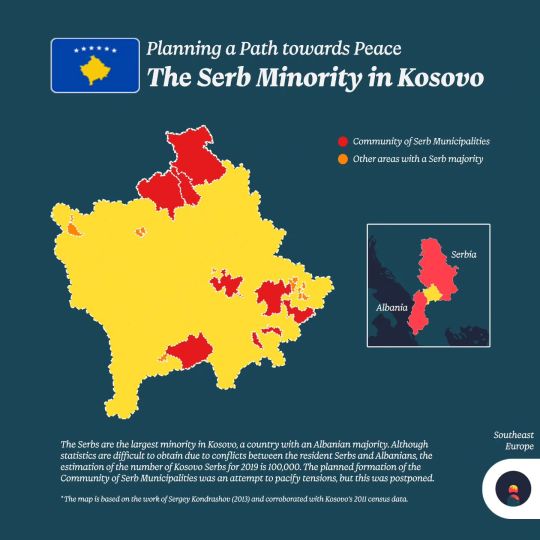
The Serb minority in Kosovo
The Serbs make up the largest minority of the population in Kosovo, a Balkan nation with an Albanian majority that proclaimed its independence from Serbia in 2008. Reliable statistics on the number of Serbs in Kosovo are difficult to obtain as a result of the complications caused by the wars and disagreements between the resident Serbs and Albanians. However, the usual estimation for 2019 is 100,000, down from around 300,000 in 1999.
In an attempt to pacify tensions in the country, the 2013 Brussels Agreement called for the formation of the Community of Serb Municipalities in Kosovo. But it was postponed due to conflicts, the most recent of which occurred in September 2023 when armed Serb paramilitaries assaulted a police patrol in northern Kosovo, killing one officer.
What do you think is the best way to bring Serbs and Albanians in Kosovo together in peace?
Sources:
Bechev, Dimitar. “Analysis: are Kosovo and Serbia on the brink of war?” Al Jazeera. 3 October 2023.
Judah, Tim. “Kosovo’s demographic destiny looks eerily familiar.” Reporting Democracy. 7 November 2019.
“Serbs.” Minority Rights Group. March 2018.
by anthro.atlas
41 notes
·
View notes
Text
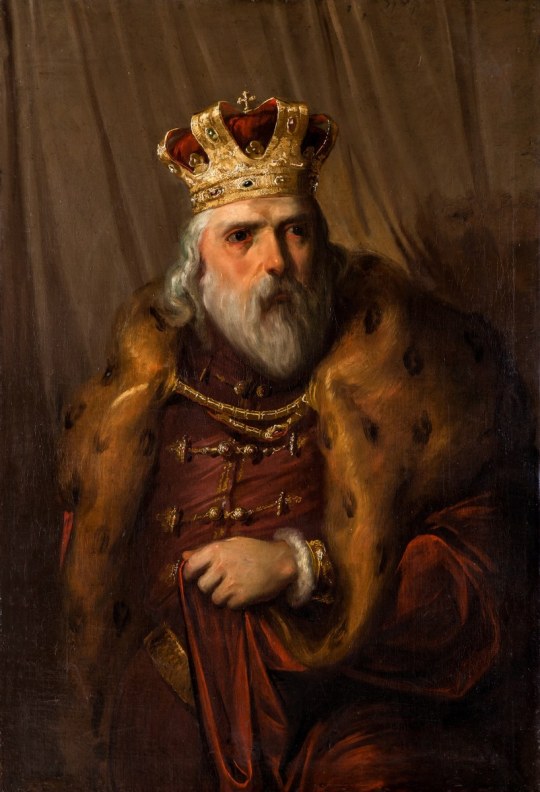
Lazar Hrebeljanović (1329-1389) by Đura Jakšić.
He was a medieval Serbian ruler who created the largest and most powerful state on the territory of the disintegrated Serbian Empire.
#Đura Jakšić#Lazar Hrebeljanović#lazar of serbia#Лазар Хребељановић#serbian orthodox church#Цар Лазар Хребељановић#battle of kosovo#Autocrator of all the Serbs#Цар Лазар#tsar lazar#kingdom of serbia#serbian kingdom#Краљевина Србија#yugoslavia#Lazarević dynasty#House of Lazarević#Лазаревић#Moravian Serbia#Principality of Moravian Serbia#Кнежевина Моравска Србија
4 notes
·
View notes
Text
Sometimes I look at other Countryhumans fans and wonder if we're in the same fandom
#NEED y'all to remember these are also whole ass countries with history when you characterise them#Croatia characterizations piss me OFF sometimes#buddy these people celebrate operation storm😭😭😭#I won't say Serbs are any better either some of them mfs want a second srebrenica#but it's always “haha Serbia warcrime haha😂”#never ONCE did I see the Croats get the same treatment we do#also the characterization of Kosovo??? lol#“Serbia's ex” buddy#what#help#WHAT led you to that conclusion#“oughh but if Kosovo is Serbia's child that implies-” buzzer sound#asexual reproduction. next question#the way mfs portray Japannnnn#buddyyy#can we keep in mind what the Japanese did pleaseeeee#also mfs who think Serbia and Montenegro would have a good relationship make me laugh#i don't think they'd have a BAD one per se but a complicated one surely#Montenegrins are the same motherfuckers who joined NATO and recognized Kosovo#I think Serbia's parasocial relationship with like. everyone tbat exists is like really funny#Bro thinks someone cares about her😂😂🔥🔥🔥🔥#I think like the few people that do actually like her and enjoy her presence are Romania Greece and China#everyone else she cares about just kinda does NOT care back#Russia? No. Montenegro? Ehhh.#Bulgaria? Serbia didn't think this guy particularly liked her in the first place but#when she caught the guy literally stalking her she solidified that thought#smells like EU business!#on the topic of EU im sick of mfs portraying the organisations as competent lol#ok I'll shut the fuck up#⭐ ;; zaharije
12 notes
·
View notes
Text
#it's kind of true#one of my best friends in uni was this liberal serbian girl#she followed a pretty standard run of the mill turbo urban liberal thought you would find in like london or amsterdam but#she was a hardcore serb nationalist at the same time#it was so funny being at a house party and seeing someone having the misfortune of stating their stupid opinion on kosovo or nato to her#she was merciless with it#most liberal metropolitan serb#meeting her brother was funny though as he had a chetnik tattoo and he was vibing well with my azovite ukrop friend#vid
24 notes
·
View notes
Text
and like, wtf is up with kosovo albanians ending up in the streets for israel support ey??
#youd expect like oh u know theyre muslim and history of genocide during yugo fallout oh yea sympathy for palestine Nope#ehm *cough* id reckon its got something to do w the current treatment of serbs in kosovo which noone wants to talk abt cuz#we still wanna pretend in the Fucking Balkans out of all places somehow dynamics cant change and we dont go through cycles of back and fort#opression#*ehm* want to create ethnostates and using history of genocide to justify genocide#*ehm* israel
8 notes
·
View notes
Text
I open tumblr for the first time today and y'all suddenly think the entire serbian national team supports genocide??
#y'all believe everything you read on the internet?#serbia is absolutely the most problematic country of the balkan#but like... kosovo je srbija is a really normal opinion there#and it does not automatically imply genocide#jezus fucking christ#anyway i will remain mostly discourse free and support my sunshine serbs
11 notes
·
View notes
Text
Ban on Serbian dinar in Kosovo creates hardship for local Serbs, US envoy says
Kosovo’s decision to ban the use of the Serbian dinar in its northern region is causing hardship for local Serbs, a senior US official said on Thursday.
US Special Representative for the Western Balkans Gabriel Escobar said Kosovo Prime Minister Albin Kurti had promised him to consider some of his proposals on the issue. Escobar after meeting with Kurti in the capital Pristina said:
The prime minister accepted this and promised to look at some of the proposals I presented to him today.
Escobar emphasised that the central bank’s decision on the dinar has created difficulties for some citizens of the country, adding that the new regulation makes life difficult for Kosovo Serbs. He also added:
We will continue to work on this issue, which is an urgent humanitarian issue that must be addressed immediately.
The Serbian government’s Kosovo Office announced on Monday that the Serbian Postal Bank has opened four improvised bank branches near border crossings with Kosovo where Kosovo Serbs can withdraw their income from the Serbian state, such as salaries and pensions in dinars.
Read more HERE

#world news#world politics#news#europe#european news#serbia#serbs#kosovo#dinar#euro#currency exchange#currency#budget
0 notes
Video
youtube
Europe Wants Concrete Steps By Kosovo #kosovo #albania #serbs #chechen ...
#youtube#Europe Wants Concrete Steps By Kosovo. kosovo albania serbs chechen balkan news youtube eu The European Union will not lift political and e
0 notes
Text
Russians are likely to have chain of command of a generation consisting of those who still remembered croatian/serb war, kosovo, and so they’re likely to fortify and reinforce as well as stockpiling arms in the russian occupied regions of donetsk & luhansk in anticipation of winter surprise attacks by ukrainian forces to rout russian front.
the perpetual russian assaults on bakhmut & avdiivka are reconnaissance & preemptive strikes to keep its own frontline mobile & alert despite of futile losses. russians are likely to believe that battles will favor russians as long as they continue to apply pressure along the fronts during the next couple of months.
1 note
·
View note
Text

▪️A Serbian bride dressed in serbian traditional clothes from Sredska, Sredachka zhupa(srb. Средачка жупа/lat. Sredačka župa), Southern Serbia 🇷🇸
▪️Time: 1880s
#serbian#balkan#europe#serbian beauty#serbian traditional clothes#serbian folklor#serbian women#serbian tradition#Serbian culture#Serbian family#Serbian bride#old phography#19th century serbia#19th century#serbian aesthetics#Serbian folklore#Serbs#Sredska#Sredačka župa#Kosovo i Metohija
279 notes
·
View notes
Text
Qu'est-ce qui se cache derrière les tensions entre le Kosovo et les Serbes ?

Qu'est-ce qui se cache derrière les tensions entre le Kosovo et les Serbes de souche ? Les récentes tensions entre les Serbes de souche et les autorités kosovares ont atteint un niveau dangereux, la Serbie menaçant d'envoyer des troupes. Les tensions entre la minorité ethnique serbe et la majorité ethnique albanaise du Kosovo font à nouveau la une des journaux.

L'épicentre du conflit se situe dans le nord du Kosovo. Quels sont les derniers développements ? Lundi, l'armée serbe a brièvement stationné des obusiers sur un site situé à seulement 2 kilomètres (1,2 miles) de la frontière avec le Kosovo. Après avoir pris quelques photos mises en scène et fourni des images spectaculaires aux médias pro-gouvernementaux de Belgrade, la capitale serbe, les armes ont été renvoyées dans leurs casernes. Ce geste a provoqué un regain de tensions à la frontière, après que des témoins oculaires et des soldats de la paix dirigés par l'OTAN, connus sous le nom de KFOR, ont signalé des coups de feu tirés près d'une barricade érigée par les Serbes kosovars ces dernières semaines. Jusqu'à présent, on ne sait pas qui a tiré les coups de feu, ni s'il s'agissait "seulement" de coups de semonce ou d'un échange de tirs. Le Premier ministre kosovar Albin Kurti a demandé à la KFOR de lever les barrages routiers de l'ethnie serbe. "Si la KFOR n'est pas en mesure d'enlever les barricades, ou ne le fait pas pour des raisons qui me sont inconnues, alors nous devons le faire", a déclaré M. Kurti mardi, dans une interview accordée au site web bosniaque istraga.ba. Pourquoi le nord du Kosovo est-il un point chaud ? Le nord du Kosovo est divisé en quatre municipalités, avec une population composée presque exclusivement de Serbes de souche qui entretiennent des liens étroits avec la Serbie. La plupart ne reconnaissent pas le Kosovo en tant qu'État. Cependant, les municipalités ont 10 sièges garantis au parlement du Kosovo et sont représentées par deux ministres au sein du gouvernement de Pristina. Depuis la fin de la guerre du Kosovo en 1999, le gouvernement kosovar n'a jamais eu le contrôle total du nord du pays - ce qui signifie que la zone située au nord de la rivière Ibar, qui compte environ 60 000 habitants, est effectivement une zone de non-droit et donc parfaite pour les criminels et les contrebandiers. Sans exception, les principaux politiciens serbes de la région sont fidèles au président serbe Aleksandar Vucic. L'ethnie serbe du Kosovo se méfie du gouvernement de Pristina, ce qui est renforcé par le fait que des unités de police spéciales sont régulièrement envoyées dans la zone nord, prétendument pour lutter contre la criminalité. Pourquoi des barrages routiers ont-ils été mis en place ? Les barrages routiers et les barricades mis en place par la minorité ethnique serbe sont un outil éprouvé dans le conflit entre le Kosovo et la Serbie. Organisées en groupes de discussion en ligne, ces barrières peuvent paralyser la région en quelques minutes, en bloquant les routes et les passages frontaliers. Le contexte de la protestation actuelle est l'arrestation d'anciens officiers de police du Kosovo de nationalité serbe. Le bureau du procureur du Kosovo a accusé l'un de ces hommes d'avoir commis un attentat à la bombe dans les locaux de la commission électorale de Mitrovica, dans le nord dominé par les Serbes. Outre la libération des policiers, les Serbes protestataires exigent le retrait des unités spéciales de la police du Kosovo de la partie nord du pays. L'objectif de la minorité serbe était d'empêcher la tenue d'élections locales, devenues nécessaires dans le nord après la démission de tous les Serbes de souche des institutions publiques du Kosovo, tant au niveau local que national, début novembre. Les quatre maires du nord du Kosovo ont démissionné, plusieurs centaines de policiers serbes ont quitté les forces de police du Kosovo et les juges serbes ont cessé de se rendre au travail. Ce boycott était une réaction au projet de Kurti d'introduire une nouvelle réglementation sur les plaques d'immatriculation, l'objectif étant d'interdire les plaques émises par les autorités serbes et de les remplacer par des plaques du Kosovo. Pour Kurti, il s'agissait d'une question de principe car la Serbie n'accepte pas les plaques d'immatriculation du Kosovo. Mais pour le président serbe Vucic et les Serbes du Kosovo, il s'agit d'une préparation au "nettoyage ethnique". L'introduction de nouvelles plaques d'immatriculation a été suspendue pour le moment, tout comme les élections locales, en raison de la pression exercée par l'Union européenne et les États-Unis. L'Occident a également appelé la Serbie à contribuer à l'apaisement des tensions, mais cela ne semble pas probable pour le moment. La Serbie pourrait-elle envoyer des troupes ? Bien qu'il soit peu probable que la Serbie déploie effectivement des troupes, M. Vucic les a placées en état de "préparation renforcée" à plusieurs reprises ces dernières années. À la mi-décembre, le gouvernement de Belgrade a officiellement demandé à la KFOR d'autoriser le stationnement de policiers et de soldats serbes sur le territoire kosovar. Cette demande est possible en vertu de la résolution 1244 du Conseil de sécurité des Nations unies, adoptée en 1999 après une reddition de facto de la Serbie. Elle autorise l'envoi de quelques centaines d'agents des forces de l'ordre au Kosovo, mais uniquement si la mission internationale de maintien de la paix KFOR donne son accord. Même Vucic a ouvertement admis que sa proposition sera probablement rejetée. Selon les analystes, il fait de la propagande. Ses détracteurs affirment qu'il veut se distinguer en tant que champion de "tout ce qui est serbe". Les observateurs affirment que même s'il envisageait sérieusement l'option militaire, elle serait futile car elle conduirait à une confrontation directe avec les unités policières et militaires internationales stationnées au Kosovo. Une solution au conflit est-elle en vue ? Même avec une pression accrue de la part de l'Occident, il y a peu d'espoir d'une résolution à court terme. Les positions sont fermement ancrées des deux côtés : Belgrade ne reconnaîtra "jamais" l'indépendance du Kosovo, qui, selon elle, viole le droit international, tandis que Pristina a déclaré que les discussions avec les anciens "occupants serbes" n'auraient de sens que si elles aboutissaient à cette reconnaissance. Un peu moins de 100 pays, dont 22 États membres de l'UE, reconnaissent le Kosovo comme un État indépendant. Le Kosovo a besoin de l'approbation des Serbes pour devenir membre de l'ONU - car la Russie et la Chine, toutes deux partenaires de la Serbie, ont un droit de veto au Conseil de sécurité. La France et l'Allemagne ont présenté une proposition pour parvenir à un accord sur le statut du Kosovo, mais jusqu'à présent, les détails sont rares. Selon des initiés, la proposition sera fondée sur le traité fondamental de 1972 entre la République fédérale d'Allemagne et la République démocratique allemande - la Serbie ne serait pas tenue de reconnaître explicitement le Kosovo, mais elle devrait accepter son intégrité territoriale et sa souveraineté et ne pas bloquer activement son adhésion à toutes les organisations internationales. La carotte pour les deux parties serait la perspective d'adhérer à terme à l'UE. La Serbie a officiellement demandé à adhérer au bloc, mais les négociations sont lentes. Le Kosovo n'est pas encore candidat mais prévoit de demander son adhésion avant la fin de l'année. Quel est l'impact de la guerre en Ukraine ? Depuis février, on craint que la Russie n'utilise ses liens étroits avec la Serbie pour ouvrir un "second front" dans les Balkans. Le Premier ministre kosovar, M. Kurti, a laissé entendre que la Serbie, comme la Russie, rêvait également de restaurer un "monde serbe" dans la région. De son côté, le Serbe Vucic a déclaré que Kurti se comportait comme un "petit Zelenskyy". Au grand dam de l'UE, la Serbie ne s'est pas associée aux sanctions contre la Russie. Selon les sondages, plus de 80 % des Serbes rejettent l'idée d'imposer ces sanctions à un "État frère". La Serbie est non seulement dépendante du gaz russe, mais aussi du soutien russe dans la question du Kosovo. Pourtant, une grande partie de l'économie serbe est orientée vers l'Occident. Les entreprises allemandes présentes en Serbie fournissent environ 75 000 emplois. Les hommes politiques occidentaux, dont le chancelier allemand Olaf Scholz, semblent déterminés à limiter l'influence russe dans les Balkans. M. Kurti a déclaré qu'un "accord global de normalisation" entre la Serbie et le Kosovo devrait être conclu au printemps. Mais en l'état actuel des choses, cela semble trop optimiste. Read the full article
1 note
·
View note
Link
0 notes
Text
i've been working as a research assistant on a project looking at media depicting "warchitecture" in the yugoslav wars, chechnya and ukraine, and interpreting that as both historico-cultural semantics and as actual media. the project was inspired by and basically predicated on, the work of architectural philosopher/urban theorist andrew herscher, so i have a lot of the ideas from his work fresh in my mind. so with the ceasefire ending and israel's genocide continuing, i feel like it would be constructive to just share a bit from his book violence taking place: the architecture of the kosovo conflict.
herscher was working on his phd in the late-90s when the international criminal tribunal for the former yugoslavia (ICTY) asked him to join the prosecution and be an expert witness on the destruction of buildings during serbia's ethnic cleansing of kosovo 1998/99. and when working in the balkans collecting evidence and writing reports for the ICTY, he realised that relegating the destruction of architecture to an externality of violence was absent of the fact that the destruction and construction of architecture is a productive medium for expresing historico-cultural and political semantics -- invoking ideas of present and historical material conditions and realities, and enforcing them. in the case of kosovo, this was serbs ensuring the alterity of kosovar-albanians, projecting serbian orthodoxy over kosovar-albanian islam, destroying their communities to ensure they could not retain their autonomy, etc. one of the most common instances hersher encountered were the minarets of mosques being toppled, but the building left otherwise mostly intact. this is violence as performance, and as a means of engaging in a cultural discourse to marginalize and eliminate a community. it's a kind of violence which architecture reciprocates and reproduces meaning in.
attached a bunch of excerpts below. consider gaza and the experience of palestinians, and remember that the yugoslav wars ended with 161 political and military leaders being brought before a judge at the hague.

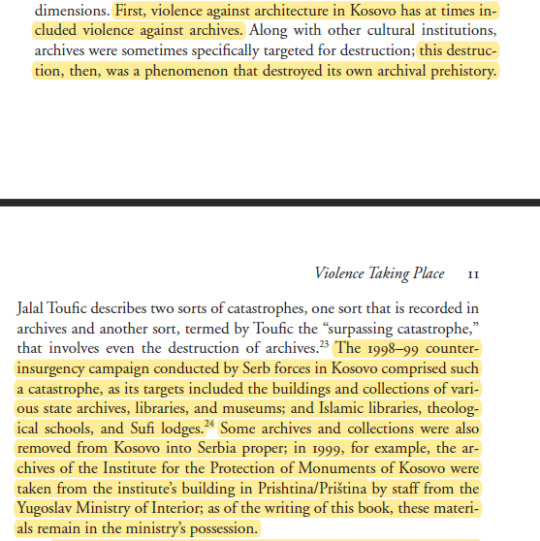

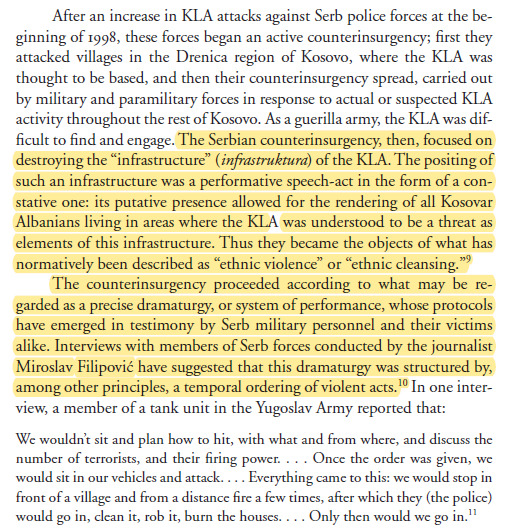
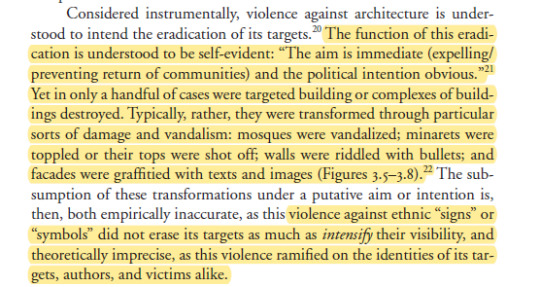
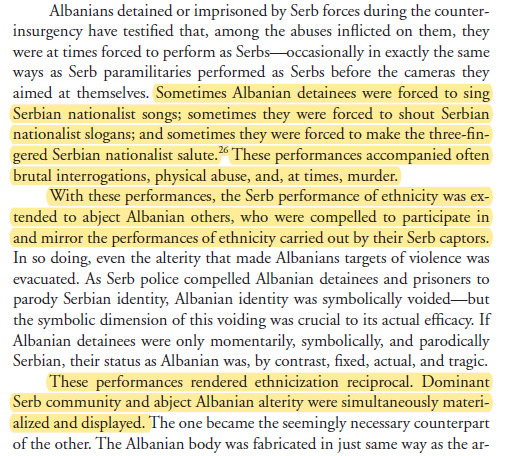
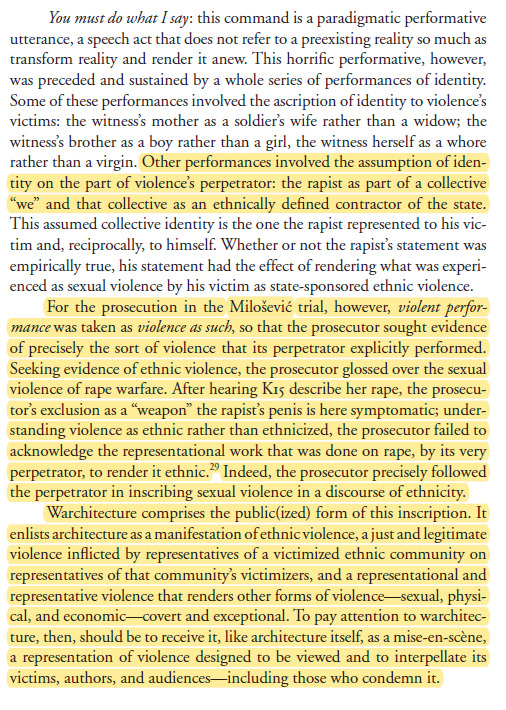
304 notes
·
View notes
Text
noone in the balkans deserves to pay for the sins of their ancestors. ive been saying this for awhile. innocent children and people should not be paying for the sins of their ancestors and everyone in the balkans needs to stop wanting to convince of themselves as the Only Ultimate Victim in every situation ever and wanting to justify more horror for the horrors of the past. there are no clean hands. we are caught in a horrid vicious cycle of revenge and bullshit and opression and it needs to fucking stop
#yes this is about serbs being opressed in kosovo#'but serbian committed war crimes' great who hasnt. is this any justification for children being shot#literally who hasnt commited war crimes opressed innocents displaced people or committed genocides here.#who hasnt had issues with insane ethno nationalism exactly. right. noone. its all fucking horrible#its all a fucking tragedy beggining to end
12 notes
·
View notes